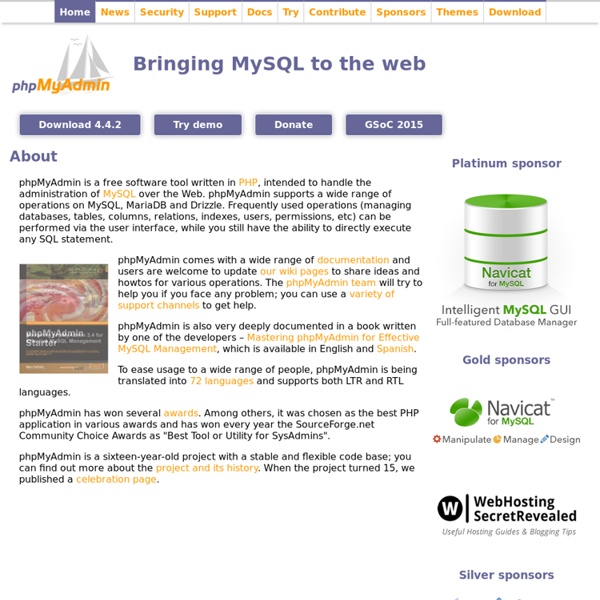



Welcome to MariaDB! - MariaDB CodeIgniter A Brief History 2006: CodeIgniter was born. CodeIgniter is a powerful open-source PHP framework with a very small footprint, created by Rick Ellis in 2006. CodeIgniter was born from ExpressionEngine, essentially a collection of refactored classes originally written for EllisLab's flagship CMS. Stripped of the application-specific functionality, CodeIgniter was made to be a simple and elegant toolkit, enabling rapid development of both web sites and web applications, attracting thousands of talented PHP developers. 2008: Industry leader. 2009: ExpressionEngine 2.0. Where is CodeIgniter Now? 2014: BCIT Stewardship.
ArchWiki CakePHP benchmarking AppTools Grsecurity From Grsecurity homepage: Unlike other expensive security "solutions" that pretend to achieve security through known-vulnerability patching, signature-based detection, or other reactive methods, grsecurity provides real proactive security. The only solution that hardens both your applications and operating system, grsecurity is essential for public-facing servers and shared-hosting environments. The grsecurity project provides patches to the Linux kernel which enhance security. Installation The linux-grsec package in the official repositories provides the grsecurity hardened kernel. The optional gradm package provides the userspace tooling for managing RBAC policies. Also included are checksec, pax-utils and paxtest package providing useful tooling for working with PaX and verifying that it is enabled. Original AUR version The original AUR version of linux-grsec will stay around a while, to provide more radical security features as PaX by default and strict /proc restrictions. # gradm -E
CMS comparison - WordPress vs Joomla vs Drupal / WebsiteSetup.org If you’re thinking about building a website or blog, you should consider using one of the best CMS available in the market. A CMS (content management system) helps you create, manage, and modify the contents of your website without the need for any HTML or CSS coding skills. The easy-to-use nature of the modern CMS platforms means that anyone can build themselves a great-looking website all on their own. In this post, we look through three of the most popular and best CMS platforms coming into 2020, compare their pros and cons, and help you pick one. The three best CMS that we’re looking into are: WordPressJoomlaDrupal Here’s everything you need to know about them: 1. Talking about the costs involved in using any of these CMS gets real tricky real fast. each of these three best CMS is 100% free in itself – you can download either one directly from the official websites in just a couple of clicks, but:there are other side costs that you have to take onto yourself One more thing… You’ll find: 2.
SQLAlchemy - The Database Toolkit for Python 2012-07-16 - Absolute Beginners Guide to Drupal